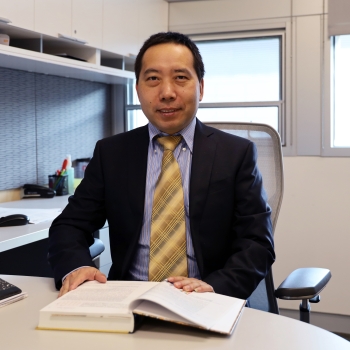Jianyong Wu, PhD
Assistant Professor
Environmental Health Sciences

“Children and senior citizens are both vulnerable groups when it comes to health, and autism and Alzheimer’s disease are major public health challenges facing these populations. My work explores the profound impact of green spaces on both of these health threats – connecting one environmental influence to the health of people from the beginning of their lives through their final years. As we delve into the therapeutic potential of nature, we can find a path toward enhancing the well-being of our youth and elderly.”
Biography
Dr. Wu's research attempts to understand the connections between environmental factors and human health outcomes using geographic information system (GIS), statistics and advanced data analytics. His current research topics include evaluating the use of SARS-COV-2 virus in wastewater as a predictor of COVID-19 infections, examining the effects of green space access on Alzheimer's disease and related dementias, and examining the effects of the exposure to green space on childhood autism.
Education
- ORISE Fellow
- US Environmental Protection Agency, 2015-2020
- MS
- Analytics, Georgia Institute of Technology, 2020
- PhD
- Environmental Health, University of North Carolina at Chapel Hill, 2011
- MS
- Public Health, University of Massachusetts, Amherst, 2007
Research interests
Environmental Health, Spatial Epidemiology, Green Space, Mental Health, Autism, Infectious Disease, GIS, Machine Learning, Cloud Computing
Select publications
- Cao Y, Martins R, Wu J. (2025). Unveiling complexity in blue spaces and life expectancy. Environmental Research. 281:121981.
- Cao Y, Wu J. (2025). Impacts of Wildfire Smoke PM2.5, Greenspace and Terrain Ruggedness on Life Expectancy in the Contiguous United States. Science of the Total Environment, 964, 178584.
- Wu J, Cao Y, Wu S, Parajuli S, Zhao K, Lee J. (2025). Current Capabilities and Challenges of Remote Sensing in Monitoring Freshwater Cyanobacterial Blooms: A Scoping Review. Remote Sensing. 217(5):918
- Wu J, McLain AC, Rosile P, Hood DB. (2024). Association between Autism Spectrum Disorder and Environmental Quality in the United States. ISPRS International Journal of Geo-Information. 13(9):308.
- Wu J, Jackson L. (2021). Greenspace inversely associated with the risk of Alzheimer’s disease in the mid-Atlantic United States. Earth. 2(1):140-50.
- Wu J. (2020). Challenges for safe and healthy drinking water in China. Current Environmental Health Reports. 7(3):292-302.
- Wu J. (2019). Linking landscape patterns to sources of water contamination: implications for tracking fecal contaminants with geospatial and Bayesian approaches. Science of the Total Environment. 650, 1149-1157
- Wu J, Rappazzo K, Simpson R, Joodi G, Pursell I, Mounsey P, Cascio W, Jackson L. (2018). Exploring links between greenspace and sudden unexpected death: a spatial analysis. Environment International. 113, 114-121.
- Wu J and Jackson L. (2017). Inverse relationship between urban green space and childhood autism in California Elementary School Districts. Environment International. 107, 140-146.
- Wu J, Yunus M, Islam MD, Emch M. (2016). Influence of climate extremes and land use on fecal contamination of shallow tubewells in Bangladesh. Environmental Science & Technology. 50 (5), 2669–2676.